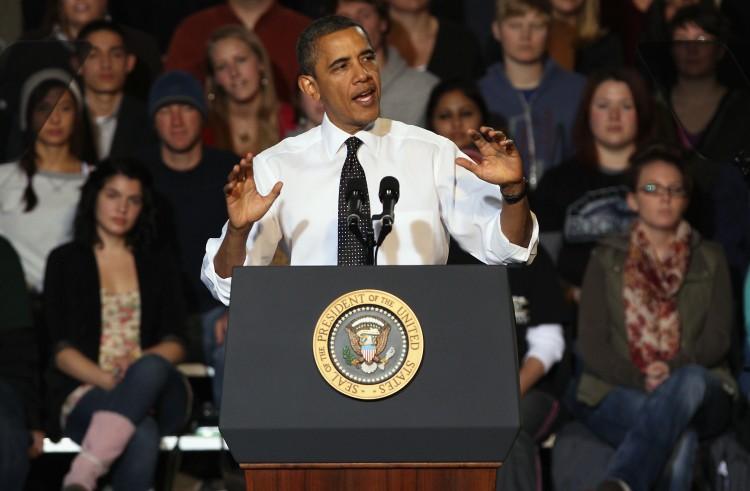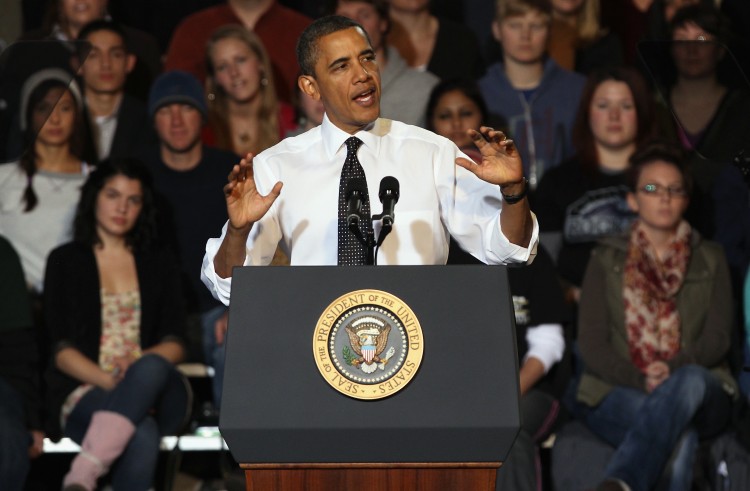Dates for the 2012 presidential debates have been announced along with a new format, which will see more online information, discussion, and interaction on debate topics.
President Obama and presumptive Republican presidential candidate Mitt Romney will go head-to-head on domestic and foreign policy issues in three 90-minute debates in October, the Commission for Presidential Debates (CPD) announced last week.
One of the debates will be held in the form of a town meeting, as in 2008, but this year the Internet will be used to extend the educational and interactive reach, said Frank J. Fahrenkopf Jr. and Michael D. McCurry, co-chairmen of the CPD, in an announcement on the CPD website.
In what is described as an “innovative Internet-based voter education program,” voters will be able to access online information about the specific issues to be debated, and then direct questions to the moderator before the debate.
“The debates are the most widely watched political programs of any kind. These format changes are designed to promote substantive dialogue before, during, and between the debates about the major issues of the day,” the co-chairmen said in the announcement.
All three debates will be run by a single moderator and take place from 9 p.m. to 10:30 p.m., Eastern Standard Time. Candidates will not be allowed opening statements, but will be given two minutes for a closing statement, the CPD said.
The first debate, to be held at the University of Denver on Oct. 3, will focus on domestic issues and will be divided into six segments of 15 minutes each. Topics will be announced closer to the date.
The second debate, the town meeting, will take place at Hofstra University in New York State on Oct. 16. Both foreign and domestic policies will be up for discussion, and an audience of undecided voters selected by the Gallup Organization will able to ask the candidates questions.
The third debate, at Lynn University in Boca Raton, Fla., on Oct. 22, will follow the same format as the first, but will focus on foreign policy.
The CPD chairmen said the more informative format is a result of studies into the effectiveness of the debates by the CPD board of directors. The CPD announcement states, “There are serious issues facing this country and the public has the right to expect a serious examination of those issues during this fall’s debates.
“The CPD believes this can be accomplished best by focusing big time blocks on major domestic and foreign topics.”
The first major political debate series in America occurred in 1858 when Abraham Lincoln (R) and Sen. Stephen Douglas (D) held seven debates across Illinois. The topics were primarily slavery and the Union, according to the CPD website.
It was not until 1960 that the first presidential debates took place, when Sen. John F. Kennedy (D) debated then Vice President Richard Nixon (R). The four “Great Debates” were broadcasted via television to over 60 million people and were credited for helping JFK’s election prospects.
It was 16 years before the next presidential debate, however, when President Gerald Ford (R) agreed to debate former Georgia Gov. Jimmy Carter (D).
The CPD, described as a nonprofit, nonpartisan organization on its website, has sponsored and produced the debates since 1987.
This year, a vice-presidential debate will be held at Centre College in Danville, Ky., on Oct. 11. The candidates will discuss both foreign and domestic issues.






